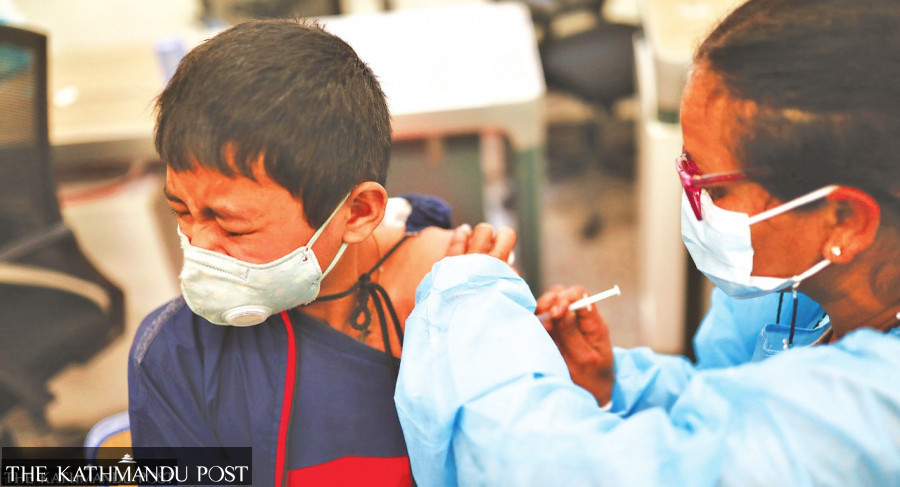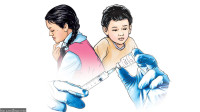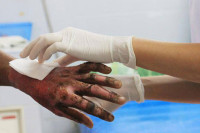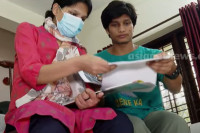Health
Around 1 million children above five years deprived of Covid vaccine
Recorded infections could just be the tip of the iceberg, with active case hunt yet to start.
Arjun Poudel
Amid a rise in new cases of the coronavirus, concerns have grown about hundreds of thousands of children above five years old who have not yet been vaccinated against Covid.
Officials at the Ministry of Health and Population estimated that there could be around one million children above five years old who have not received even a single dose of the vaccine.
“Hundreds of thousands of children throughout the country, who were below five years of age and were not covered by the Covid vaccination campaigns have now become eligible for the vaccine,” said Dr Abhiyan Gautam, chief of the Immunisation Section at the Family Welfare Division under the Department of Health Services. “We have started preparations to bring pediatric doses of the vaccine for children of the said age group.”
Children between five and 11 years were inoculated with pediatric doses of the Pfizer-BioNTech Covid vaccine after the Covax facility, the UN-backed international vaccine sharing, supplied around 8.4 million doses last year.
As health authorities failed to inoculate all eligible children at the time, thousands of vaccine doses expired. But tens of thousands of children, who reached five after the vaccination campaigns stopped, remain unvaccinated.
Infectious disease experts as well as virologists have asked parents to take extra precautions to protect their children as the chances of Nepal getting pediatric vaccine doses in the midst of the ongoing new Covid wave are slim.
“The good thing is most schools are currently closed for year-end vacation,” said Dr Anup Subedee, an infectious disease expert. “So children of unvaccinated children should ensure that their children take all necessary precautions against Covid like wearing face masks, using hand sanitisers and avoiding crowds. And if their children show Covid-like symptoms, parents should isolate them and take them for Covid test.”
Nepal on Sunday recorded 38 new cases of Covid—37 from 185 polymerase chain reaction tests and one from 516 antigen tests. This shows the positivity rate of PCR tests is 20 percent.
On Saturday 38 people tested positive for Covid. The number was 142 on Friday.
Doctors say the ongoing rise in Covid cases is a clear sign that a new virus variant has penetrated communities. As authorities concerned have not started active case findings, reported positive cases could be just the tip of the iceberg.
Lately, India has been reporting a sharp rise in coronavirus cases. The country on Saturday recorded five deaths and 3,824 fresh coronavirus infections, the biggest single-day rise in the last six months, according to media reports.
Several states and territories of India, including Delhi, Maharashtra, Gujarat, Tamil Nadu, Uttar Pradesh, Bihar, West Bengal, Uttarakhand and Telangana saw a surge in new cases. Uttar Pradesh, Bihar, West Bengal and Uttarakhand are states bordering Nepal.
Scientists in India say that a new sub-variant of Covid, XBB.1.16, is responsible for the recent surge in cases. They, however, say people in India have developed a hybrid immunity due to vaccination and natural infection, so the current Covid variant will not lead to hospitalisations and severity. The Indian government has advised people to wear face masks, avoid crowds and complete their vaccination doses if they haven't already done so.
Experts link the uninterrupted cross-border movement for the rise in cases in Nepal. Thousands of people from both countries enter each other’s territories every day on top of the large number of those who use unregulated points along the porous border.
“XBB.1.16 which is considered responsible for the massive surge in infection in India might be responsible for the surge in cases in Nepal,” said Dr Sher Bahadur Pun, chief of the Clinical Research Unit at Sukraraj Tropical and Infectious Disease Hospital. “More people could get infected in the coming days, as the new sub-variant of Omicron is more infectious.”
Health Ministry officials said that they have already alerted the agencies concerned about the risks, asking them to step up surveillance. Officials believe that even if new cases surge in the coming days, they will not increase the severity rate and hospitalisation, given that both vaccine coverage rate and immunity derived from natural infection are high.
However, it has already been a year since many people were administered with booster shots. Several studies, including one carried out in Nepal, show that the immunity level achieved from vaccination or natural infection wanes after six months of the vaccination or natural infection.
“Vaccine must be brought at the earliest and all eligible people should be administered second booster shots,” said Pun. “If the government does not have sufficient doses for all risk groups especially elderly people and those having comorbidities should be inoculated first with second booster shots.”
So far, Nepal has used Covid vaccines developed by the University of Oxford and the pharmaceutical giant AstraZeneca, manufactured in various countries of Europe, India and Japan, the Chinese Vero Cell, and the US-made Janssen, Moderna, and Pfizer-BioNTech.
Government records show as many as 12,020 Covid-related deaths have been reported in Nepal.




 11.12°C Kathmandu
11.12°C Kathmandu














